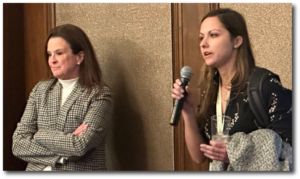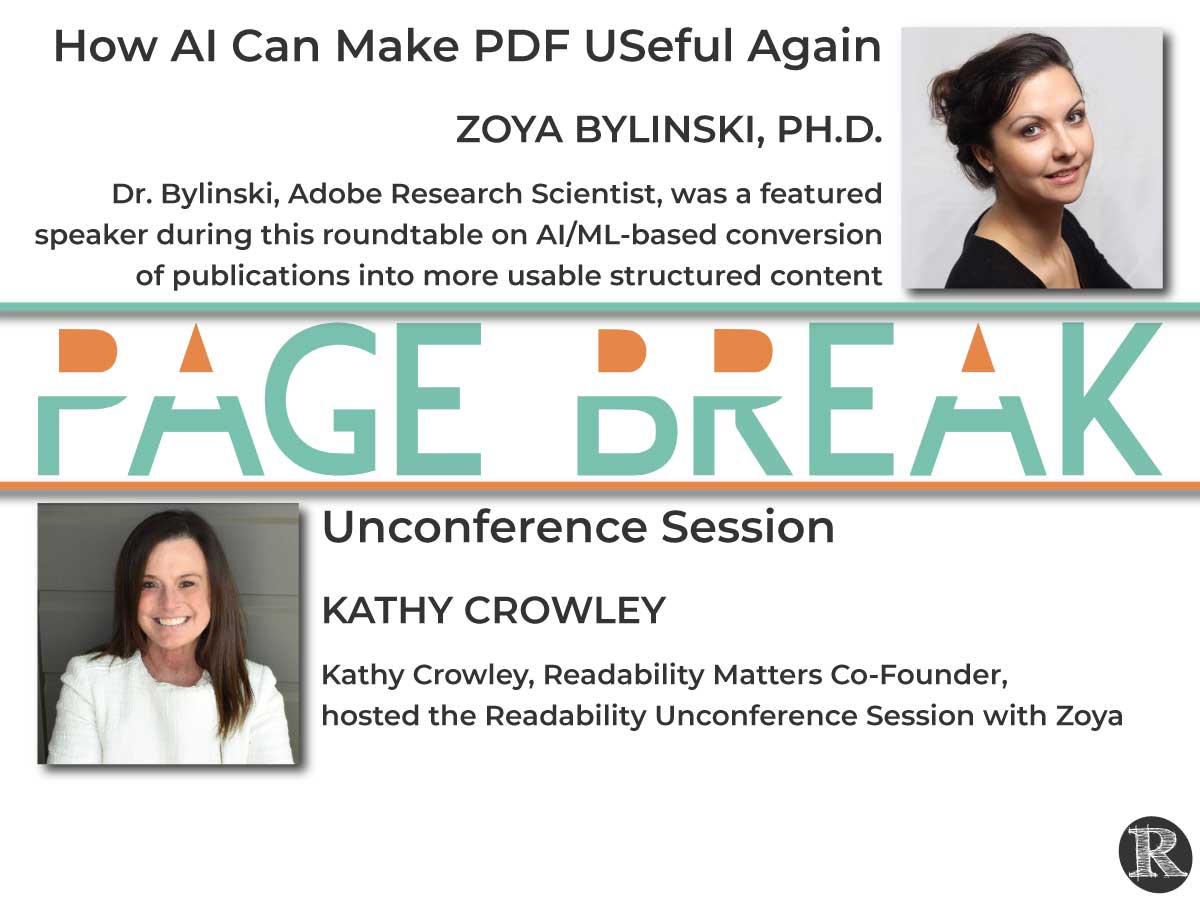Next-Generation Publishing – How to Get There
Publishing experts and visionaries gathered in San Francisco to discuss strategies for moving the publishing industry to emergent technologies, workflows, and processes. The inaugural PageBreak conference drew an impressive lineup of publishers, researchers, lawyers, librarians, technologists, and nonprofits, all focused on improving the publishing processes and ultimately creating a better experience for readers.
Readability experts and The Readability Consortium members Dr. Zoya Bylinskii and Rick Treitman of Adobe, and Kathy Crowley of Readability Matters, attended PageBreak to present recent research findings and participate in visioning discussions. In addition to participating in a roundtable panel discussion, they hosted a Readability “unconference” session.
| Unconference sessions are participant-selected and participant-driven sessions to advance important topics of interest. |
Zoya and Rick participated in the “How AI Can Make PDF Useful Again” panel, showcasing Adobe’s Reader App for mobile with “Liquid Mode.” Liquid mode reflows text from a PDF in a responsive design, making the PDF far easier to use on a mobile device. Readers can then further adjust text format settings to improve readability. Rick highlighted recent readability research and described The Readability Consortium’s plans to reinvent reading. Zoya provided an overview of Adobe’s Sensei AI/ML technology that converts PDFs into structured and more useful content and summarized research that Adobe and the Readability Consortium are doing to aid in the personalization of an individual’s reading experience. This panel featured Pamela Berkman (Benetech / Bookshare), Bill McCoy (Industry Standards leader), and Lucy Lu Wang (University of Washington / Allen Institute for AI (AI2)). Read more about the speakers here.

Kathy Crowley (Readability Matters) and Zoya Bylinskii (Adobe) at PageBreak
Zoya and Kathy pitched the unconference session, offering the participants an opportunity to learn more about improving the reading experience for the consumer – the reader – and the importance of doing so for the publishing industry. Attendees discussed how e-reader platform providers could and should benefit from personalization options. A lively discussion generated ideas on the potential for accessibility to be a gateway to providing enhanced reading options for all. A significant discussion focused on the criticality of using research-informed solutions as the goal is to improve reading outcomes for readers of all ages and abilities.
The PageBreak Conference concluded with a keynote by Tim O’Reilly (O’Reilly Media), who showcased some of the most compelling use cases for AI and ML learning algorithms and why these technologies can and will impact the publishing industry. He discussed how this was the most significant technological shift since the world wide web transformed the Internet in the 1990s, allowing the democratization of information and the explosion of worldwide knowledge.
“Artificial Intelligence and Machine Learning is not a future thing anymore—it’s happening now. It’s a transformative moment for the entire technological landscape.”
– Tim O’Reilly
PageBreak brought together an incredible ecosystem of individuals from across the publishing industry who together want to make a change for information producers and consumers – the writers and readers – all of whom can benefit from new technology and processes. We offer our thanks to the all-volunteer conference organizing team. We look forward to attending again next year.
ABOUT PageBreak: Building on the best of books in browsers and tools of change, PageBreak is a community-driven conference focused on celebrating and sharing the ways people are moving beyond traditional models and embracing contemporary technology, workflow, and processes. They seek to foster a community of people who are excited about building change together and willing to try new things.
ABOUT Tim O’Reilly: Tim has a history of convening conversations that reshape the computer industry. He’s played a key role in framing and evangelizing terms such as “open source software” “web 2.0” “the Maker movement” and “government as a platform”. He is the founder, CEO, and Chairman of O’Reilly Media, and a partner at early stage venture firm O’Reilly AlphaTech Ventures (OATV). He is also on the boards of Code for America, PeerJ, Civis Analytics, and PopVox. His book, WTF: What’s the Future and Why It’s Up to Us, explores what technology advances teach us about the future economy and government as its “platform.” He is a Visiting Professor of Practice at University College London’s Institute for Innovation and Public Purpose, where he is researching a new approach to regulating big technology platforms by limiting their ability to extract economic rents. Read more about Tim at https://www.oreilly.com/tim/.
ABOUT Unconference Sessions: The famed German scientist Alexander von Humboldt created the first Unconference in 1828, defined as a participant-driven meeting. Popularized by O’Reilly Media, the term “unconference” has been applied to a wide range of gatherings that try to avoid the top-down organization aspects of a conventional conference, allowing participants to select and engage in topics of interest.
ABOUT The Readability Consortium: The Readability Consortium was a sponsor of PageBreak 2022. The Readability Consortium (TRC) The Readability Consortium’s core mission is enhanced digital readability for all. Consortium members include the University of Central Florida and industry and nonprofit members Adobe, Google, and Readability Matters. Members guide the research with the aim to redefine the future of readability interfaces, e.g., document design, consumer electronics, healthcare, cybersecurity, finance, mixed reality, and beyond.
ABOUT Adobe Reader Liquid Mode: Adobe is using learnings from the Readability Initiative to reinvent how people read and extract information from digital documents. Liquid Mode is a tool in the free Adobe Acrobat Reader app that lets you effortlessly read documents on mobile devices. Get started with the free Acrobat Reader mobile app for mobile platforms, including the Liquid Mode Technology here Adobe Acrobat Reader Mobile App.




